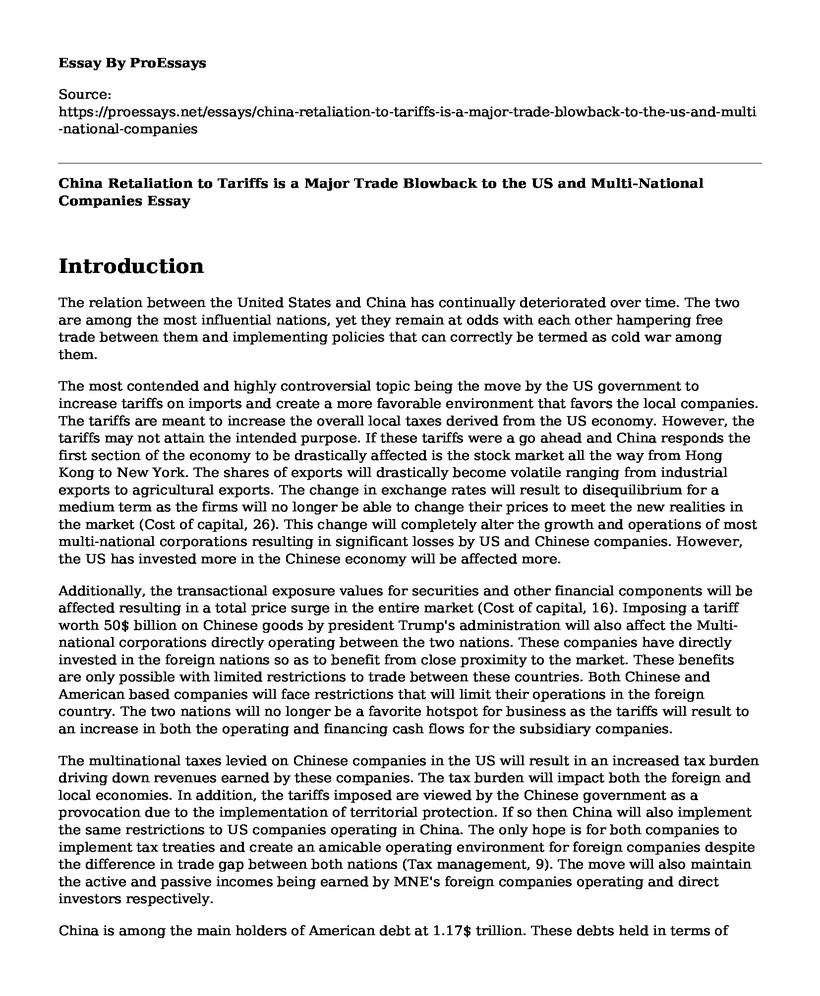Introduction
The relation between the United States and China has continually deteriorated over time. The two are among the most influential nations, yet they remain at odds with each other hampering free trade between them and implementing policies that can correctly be termed as cold war among them.
The most contended and highly controversial topic being the move by the US government to increase tariffs on imports and create a more favorable environment that favors the local companies. The tariffs are meant to increase the overall local taxes derived from the US economy. However, the tariffs may not attain the intended purpose. If these tariffs were a go ahead and China responds the first section of the economy to be drastically affected is the stock market all the way from Hong Kong to New York. The shares of exports will drastically become volatile ranging from industrial exports to agricultural exports. The change in exchange rates will result to disequilibrium for a medium term as the firms will no longer be able to change their prices to meet the new realities in the market (Cost of capital, 26). This change will completely alter the growth and operations of most multi-national corporations resulting in significant losses by US and Chinese companies. However, the US has invested more in the Chinese economy will be affected more.
Additionally, the transactional exposure values for securities and other financial components will be affected resulting in a total price surge in the entire market (Cost of capital, 16). Imposing a tariff worth 50$ billion on Chinese goods by president Trump's administration will also affect the Multi-national corporations directly operating between the two nations. These companies have directly invested in the foreign nations so as to benefit from close proximity to the market. These benefits are only possible with limited restrictions to trade between these countries. Both Chinese and American based companies will face restrictions that will limit their operations in the foreign country. The two nations will no longer be a favorite hotspot for business as the tariffs will result to an increase in both the operating and financing cash flows for the subsidiary companies.
The multinational taxes levied on Chinese companies in the US will result in an increased tax burden driving down revenues earned by these companies. The tax burden will impact both the foreign and local economies. In addition, the tariffs imposed are viewed by the Chinese government as a provocation due to the implementation of territorial protection. If so then China will also implement the same restrictions to US companies operating in China. The only hope is for both companies to implement tax treaties and create an amicable operating environment for foreign companies despite the difference in trade gap between both nations (Tax management, 9). The move will also maintain the active and passive incomes being earned by MNE's foreign companies operating and direct investors respectively.
China is among the main holders of American debt at 1.17$ trillion. These debts held in terms of bonds will be hit due to the increased demand for safe-haven investments caused by a retaliation to the tariffs. The retaliation will render US-based companies bankrupt due to increased operational costs. Furthermore, the mix of debt and equity of the company's will no longer be able to attain an optimal financial structure (Sourcing and equity, 9). The risks involved in entering in new trades after retaliation by increasing trade risks will also alter the optimal mix of equity and trade between the involved company's. Additionally, the debts outsourced from the US market is exposed to worldwide changes in the market and conflict between the two nations posing a political risk. A drastic change in the financial frameworks between the two nations due to increased tariffs and closure of markets to external companies may lead to a chop of the treasury portfolio held by China. This could inflict substantial harm on U.S. finances and global investors, driving bond yields higher and making it more costly to finance the federal government.
The changes in trade policies will affect the level of imports and Foreign Direct Investments in China and US. Chinese products and companies will not be able to access the US market and vice versa. China has the smallest share in the US in terms of exports will be less affected compared to the US. Therefore, unless the US emphasizes on discrediting the Chinese policies hampering investments by other nations in their territory the US stands at a more disadvantageous point. China has the largest number of Direct Investments due to the need for labor-intensive, small-scale productivity and export-oriented production (FDI, 9). Therefore, discrediting and lobbying for a change in Chinese trade policies will affect the direct investments by other nations in the country as the environment is no longer favorable.
Conclusion
The tariffs proposed by the US government if faces a retaliation from the Chinese government in terms of trade barriers, change in debt balance and alteration of the stock and capital markets will affect the US economy more than it will impact the Chinese economy.Cite this page
China Retaliation to Tariffs is a Major Trade Blowback to the US and Multi-National Companies. (2022, Apr 07). Retrieved from https://proessays.net/essays/china-retaliation-to-tariffs-is-a-major-trade-blowback-to-the-us-and-multi-national-companies
If you are the original author of this essay and no longer wish to have it published on the ProEssays website, please click below to request its removal:
- Chinese Economic Model
- Serving the World's Poor, Profitably Article Review
- Employment and Labor Laws Essay Example
- Unemployment of Canada Essay
- Essay Sample on 2007 Global Financial Crisis: Devastating Economic Turmoil
- Essay Example on Capitalism: The Driving Force of Productivity?
- Globalization and Its Consequences - Free Essay Example







